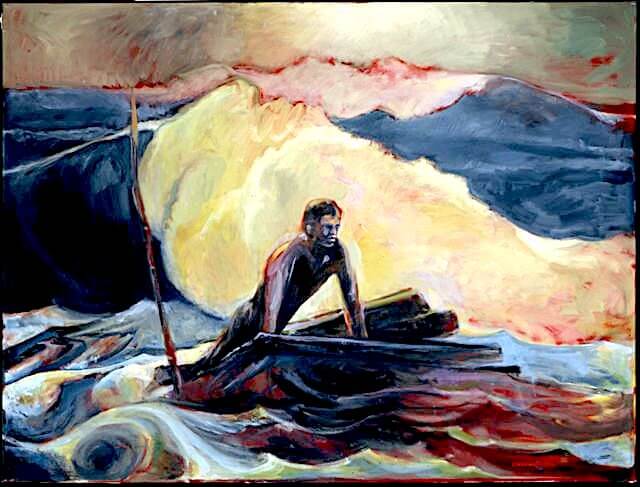
Elegy to Jack Kerouac
One day I will find the right words,
and they will be simple.
--Jack Kerouac, The Dharma Bums,1958
1
It seems as if you still stroll across a fallow field,
Walking forever past all the things Nirvana offers,
And you stumble onto the right words that take
Their place around the Great Mandala,
And the air that rises on the road you left behind,
And everything that cannot speak after you—Now
It is impossible to describe the sun you never set,
The stars becoming words, one after the other.
2
And so, it is impossible to meditate unseen
Merely by hiding your candle in sight,
If then, you were lost, unsure what path to take
In the sparking night, when you appeared
With the circling words that fell
Through your dreams to awaken your voice,
At first unheard because unexpected—
The whisper of jazz turning in upon itself.
3
How can we speak of this immeasurable space
In the emptiness that lies between us?
That crossroad is everywhere
Embracing that irrevocable beat
As we walk side by side, our feet stirring up
The same dust that leads us back to the Garden.
No one remembers how this dance began
Returning in the last exaltation of Dharma Bums.
Elegy For Amelia Earhart
Never interrupt someone doing what you said couldn't be done.
—Amelia Earhart (1897-1937)
1
Clinic pilgrimage,
Unrelenting winter day—
She paused this way at
Sherbourne and Carlton's corner,
A small plaque dated 1917.
2
She used to pass here,
What could have happened to her?
That light-hearted girl—
The secret shrine reflected in black ice,
Walking the way she took, long ago.
3
Late into evening
Discussing Amelia,
The impossible
Irrevocable cold trail
To what island exactly?
4
Reading old postcards.
Airmail served her well,
A matriarch by default—
But logic plays no role here
Her death was still untimely.
5
Mysteriously,
She glances at the ocean
Arriving at Pearl Harbor,
Still chilled stopover
In a tropic winter coat.
6
Secretly married,
Ascending the narrow path
Charted by the sea—
Up and over and away
Into the clearest blue sky.
7
Downstream by canoe.
Long nights in the bright moonlight—
Forgotten secrets
Scrawled on a cliffside wall
Fades away and disappears.
8
Rolling a wheelchair
To a widow's-walk window,
An old artist starts
To draw borrowed memories,
Elegies, not yet his own.
Among the Ruins
"We call this room the sweetest of them all,"
You said.
And I thought: "Because there is nothing here."
—Gwendolyn MacEwen; The T. E. Lawrence Poems,
The Absolute Room
1
This ancient colonnade, these heaps of stone,
Anonymous memoirs, we know them both.
Time has left us to count the hours
Since these forsaken sights were carried down,
And we believe there is a logic in these walls, an echo
And a voice between the floors that is no more.
The diggers go, though we remain last
Beyond them all as long as hopes can die—
2
On our lips, a troubadour's chant
And something more, a lost language.
Last night we woke and heard a whisper,
All around the silence of the room.
Say what you will, though, the walls
Are no more, but you can still close the doors.
And save the hearth in the center,
Surrounded by imbedded seashells.
3
And yet when I reflect, it is much more
Than adjustment, or transfiguration—
What is built is an exercise of petition
In an unfavored symmetry
Which all cultures must make, once or more,
Pleading for kindness in answer to sacrifice,
Or love, or pretense in ritual theatre.
Not being a child, I understand it less.
4
The thing we wanted most denies us now.
We weren't the first revenants to enter
The room of fears, the floor of shifting sand.
We talk until past ready to sleep, to avoid ourselves—
It is in the silence of the deep-sea dunes
We contain love in the absence of ourselves,
Abandoning all desperation seeding pain.
We must have freewill. We have no choice.